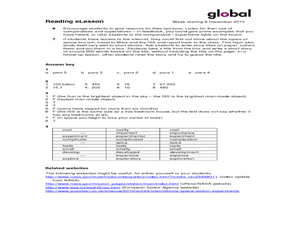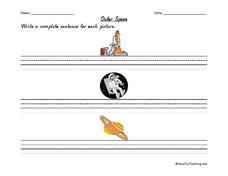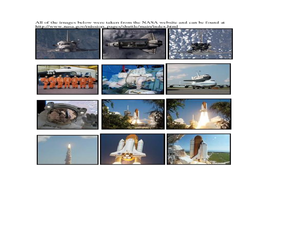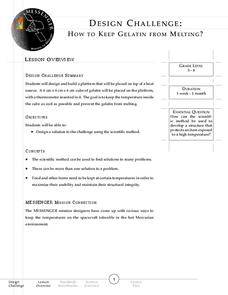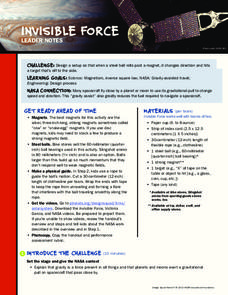Curated OER
International Space Station
Students read and complete language arts activities about the International Space Station. In this International Space Station lesson plan, students read about the space station, and complete language arts activities that include...
Curated OER
Space Exploration- Voyagers 1 and 2
Everyone loves to learn about outer space. This space exploration passage has 10 questions relating to Voyager 1 and 2. There are both comprehension and vocabulary questions. The activity could be used with upper elementary or ESL students.
Curated OER
Outer Space
In this space worksheet, students write a sentence for each picture. The pictures show a space shuttle, an astronaut, and a planet.
Curated OER
What Do I Wear Out Here?
First graders identify the components of a modular spacesuit. In this astronaut clothing lesson plan, 1st graders discuss the importance of appropriate clothing for working in space. Students define the term modular and explore an...
Teach Engineering
Get Me Off This Planet
What do Newton's Laws have to do with getting from Earth to Mars?The activities in this resource show how Newton's Laws work with rockets to get them into space. Background information includes facts about orbits and how orbits are used...
Curated OER
The Space Shuttle
Students share what they comprehend about the space shuttle program. They are given information about the first space shuttle mission. Students work in groups to investigate the different shuttle missions from April 1981 through January...
Curated OER
Build a Space Shuttle
Pupils explore the concept of space. In this space lesson plan, students pretend to be aerospace engineers. Pupils build space ships out of cardboard tubes. Students discuss what aerospace engineers do. Pupils model their space ships...
NASA
Space-Based Astronomy on the Internet
Young scientists compile everything they have learned into a report in the fifth and final lesson in a unit on the visible light spectrum. Access to photos from observatories, telescopes, and satellites allows learners to compare and...
Curated OER
Lifting Bodies: Designing Your Own Spacecraft
Learners work cooperatively with classmates to design a wingless vehicle that can fly back to Earth from space, landing like an aircraft. Students plan and describe their models. Also, they will research facts about the lifting body...
Curated OER
Space Food
What do astronauts eat in outer space? Kids can read an informational passage to learn about space food. The passage includes prompts that have learners identify the main idea and key details, then write a paragraph summarizing the text....
Curated OER
Nasa's Return To Flight: Testing In
Students explain basic components of the space shuttle stack and the chemical fuel makeup and storage used on the external tank of space shuttle. They discuss findings of Columbia mission accident. and the safety improvements that have...
Curated OER
Space Shuttle Statistics
students are the opportunity to enhance their computation skills using real life statistics associated with the Space Shuttle. Skills emphasized include working with fractions, decimals, percents, ratios and proportions, comparing units,...
Curated OER
The Cassini Robot
Students compare the functions of a robot to that of the human body. In this technology lesson plan, students identify the important components of the Cassini robot that would enable it to carry out space missions. They design and build...
Curated OER
Space-Age Experiments
Students evaluate the notion of aging by reviewing some of the studies that occurred on John Glenn's space shuttle mission.
Alabama Learning Exchange
Attitude Determines Altitude
A fabulous lesson plan which combines mathematics with space science. Middle schoolers work in cooperative groups in order to research early astronauts and their accomplishments. They look at a variety of rocket and space shuttle...
Curated OER
Stoichiometry in the Real World
Real world chemical reactions are used as examples for teaching stoichiometry. Viewers work through air bag inflation, fat conversion to water in a camel, rocket fuel combustion, and carbon dioxide removal in spacecraft. Make...
Education World
Every Day Edit - Mars Odyssey
For this everyday editing activity, students correct grammatical mistakes in a short paragraph about the Mars Odyssey spacecraft. The errors range from punctuation, capitalization, spelling, and grammar.
International Technology Education Association
Dampen That Drift!
The spacecraft is drifting too far off course! Two games help explain how a spacecraft can use its thrusters to maintain its position. The games have pupils be the components of vectors in order to create and counteract the disturbances.
DiscoverE
Touch Down
Protect the marshmallows! Groups create contraptions that will keep marshmallows in a cup, even after dropping them from a certain height. This is a fun way to model the shock-absorbing capabilities of spacecraft.
NASA
Space Images
As technology advances, so does our understanding of the universe around us. Thanks to the Hubble Telescope, Mars rovers, and other high-resolution cameras, there are amazing photographs of celestial bodies, planets, comets, and more...
Messenger Education
Design Challenge: How to Keep Gelatin from Melting
The inside of the spacecraft Messenger, which explores Mercury, will experience temperatures from 32 to 91 degrees Fahrenheit. In the final installment of a series of four space-related activities, groups spend time discussing and...
PBS
Invisible Force
Investigate invisible forces. Young engineers design a setup that changes the direction of a steel ball using a magnetic force. The purpose of the setup is to model the gravitational pull of spacecraft by planetary bodies.
University of Colorado
Distance = Rate x Time
Every year, the moon moves 3.8 cm farther from Earth. In the 11th part of 22, classes use the distance formula. They determine the distance to the moon based upon given data and then graph Galileo spacecraft data to determine its movement.
Curated OER
Data Handling Techniques
Learners study data analysis methods. For this data analysis lesson, students study data compression and data editing methods used for the spacecraft Galileo. Learners study the 'lossless' and 'lossy' techniques.


